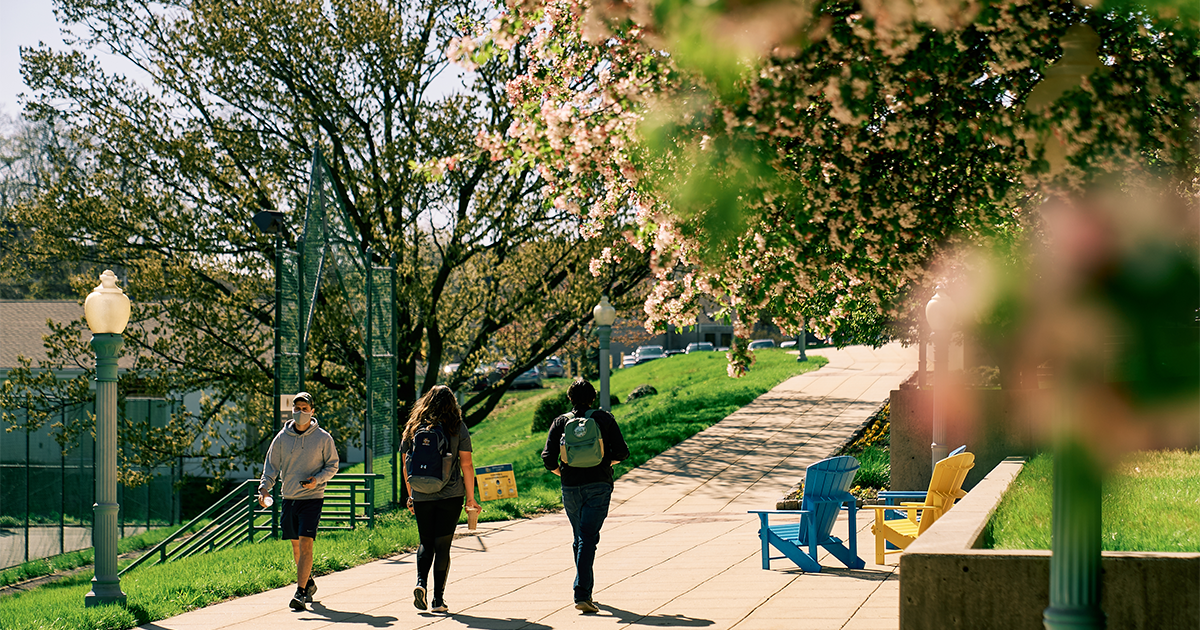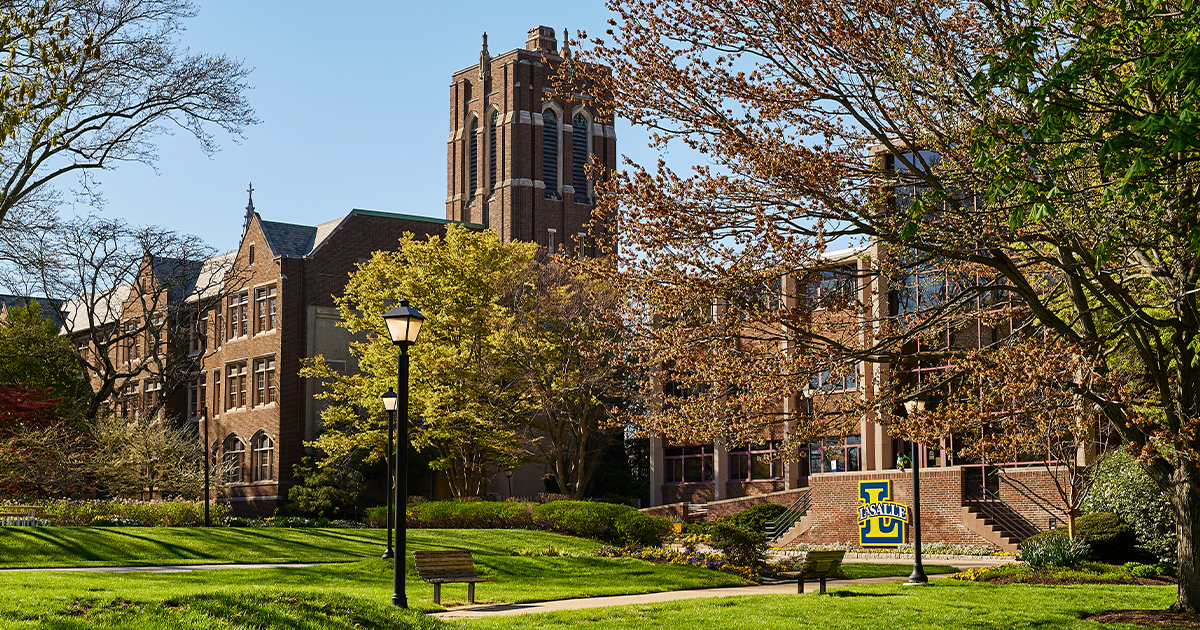La Salle University
How COVID-19 will shape life for years to come
From mRNA vaccines to policy change, La Salle University faculty weigh in on how the world will be forever changed by the coronavirus pandemic.
The world changed in early 2020.
Unquestionably, COVID-19 has altered the way we live, work, and socialize. Some of these new patterns and habits will have long-term effects, potentially changing the course of life forever.
We asked La Salle University faculty across varying academic disciplines to apply their expertise—from healthcare and virology, to education and public health—to reflect on the change brought on by COVID-19 and its lasting effect.
The future of mRNA vaccines is boundless
One of the most profound ways that this pandemic has changed the world and medicine in particular is maybe the most obvious—the widespread use of mRNA vaccines. This technology has been making the slow transition from a theoretical idea to small animal studies to experimental medicine for many years, only to find its moment in 2020. We all know how quickly vaccines specific to the virus that causes COVID-19 were designed and developed, and how promising the protection was. However, we are just starting to scratch the surface of how powerful these vaccines are and how many different uses they will have in the future. First, never before have we been able to make a vaccine that activates T cells and is as safe to use as an mRNA vaccine. Those T cells are the reason the original vaccine maintains its ability to protect against severe disease and death, even with the emergence of variants and breakthrough infections. That protection is increased with booster shots and third doses.
In the future, we may see new versions of this vaccine that have been changed to match emerging variants. This is a process that is orders of magnitude easier with mRNA than with proteins or whole viruses. We might also see existing vaccines replaced with new and improved mRNA versions. Imagine a flu shot that is 95 percent effective rather than 70 percent, or one that lasts five years instead of one. These new vaccines will not only allow us to eventually end this pandemic; they will make life better in many other ways in the years ahead.
Brian DeHaven, Ph.D., is an associate professor of biology who specializes in virology, microbiology, and immunology.
Communal wellness starts with disincentivizing perfect attendance
The unexpected stresses and burdens of the pandemic have made us reckon with the gaps and inequities in our systems. I hope we can effect abiding change in our culture around health and sickness. It would be unthinkable today to come to work coughing, sneezing, and with a low-grade fever, but that has been the norm and expectation for decades. Why did we do this? In large part, it’s because our policies around sick days and expectations around work that incentivize working while ill. This is also true in classrooms that demand strict attendance policies without providing a mechanism to support students who really should stay home for their health and the health of the class.
We need to continue our dialogue and strive for better policies and systems that honor the burdens of being sick and caring for the sick. We have developed many tools during the pandemic to support flexible working and learning. These tools include policies like a relaxed attendance expectation in the classroom, or more options for working from home and paid sick leave for employees. We need to expand these policies to explicitly include the needs of caretakers, be that for a parent who needs to stay home with a sick child or care for an elder. We also need to normalize some of the physical and behavioral tools, like masking and physical distancing, that support individual and community health. For example, an instructor who is teaching while undergoing chemotherapy might require students in their classroom to be masked to reduce the risk of infectious disease while the instructor is immunocompromised.
At the same time, we should be careful that these expanded policies and tools are not to be used to raise the expectation around work to a more untenable level. (Remote work options could easily be abused as a reason to expect the same level of work from staff despite their being ill or caretaking responsibilities.) Above all, I hope we better recognize the burdens of being ill and build more flexible systems that promote healthy work.
Jason Diaz, Ph.D., is an assistant professor of integrated science, business, and technology. He utilizes his business and technology expertise to explain why work from home and flexible sick time is here to stay.
After the pandemic, public health must remain a priority
Prior to COVID-19, many people would have struggled to describe or define public health. (In fact, many of my students and I have experienced the blank stares received from family and friends asking what exactly public health is when announcing our commitment to the field.) While COVID-19 has allowed more people to become familiar with the field, many still don’t fully appreciate the broad scope and mission of Public Health. I like to describe it simply as the “art and science of preventing disease and promoting health.” Our mission in public health is to “fulfill society’s interest in assuring the conditions in which people can be healthy”. Thus, we consider the many determinants of health and conditions that promote and inhibit health.
As we endure multiple variants and become comfortable with the likelihood that COVID-19 will become endemic, hopefully we can identify lessons learned that better prepare us to promote healthy communities across the country and commit ourselves to creating conditions that support health. In a post-COVID world, or at least a world in which discussions about the virus occupy less space, we must take prevention seriously and work to promote equity. Public health can no longer be a foot note, afterthought, or an investment of convenience. Our lives depend on our ability to understand our current situation as well as our needs for a healthier tomorrow. Unfortunately, our leading health issues have not disappeared throughout the pandemic. Many public health issues plague us and inequities are rampant. We must commit to reimagining a society that prioritizes health in every sector.
To promote population health, we can:
- Adequately fund public health at the federal, state and local levels.
- Invest in research exploring evidence-based strategies for promoting heath equity, use of technology in health, the role of media in health and interventions to address structural determinants.
- Promote cross-sector collaborations.
COVID-19 has undoubtedly exacerbated many public health issues. As we continue to navigate the pandemic, we must consider the mental health consequences of the restrictions, limitations, and challenges faced. As we reimagine ourselves, we must consider how these variables laden by structural and policy violence influence feelings of frustration and hopelessness (among many others) that lead to aggression, violence, depression and anxiety as well as other outcomes in diverse communities. We’ve continued to observe increases in these areas. We must act to prioritize mental health as a key component to healthy populations while also dismantling the systems, programs and policies that promote inequity and conditions that inhibit health. May we be even more committed to strengthening communities and recognizing the assets and contributions of diverse members.
Candace Robertson-James, DrPH, is an assistant professor and the director of La Salle’s Master of Public Health program.
A new perspective on learning in and out of the classroom
It is no secret that COVID-19 dramatically impacted the field of education. Teachers and students (and families) were required to quickly pivot and, in many ways, dramatically change how information was presented, received, and learned. This was not as simple as moving meetings to a virtual space. This shift required students, families, and teachers to completely adjust what they do. Relationships, procedures, routines, and instruction were completely uprooted. Those shifts have been challenging for all, but disproportionately in special education, in which accommodations and modifications are generally in-place for face-to-face learning.
While the pandemic continues to be a disruptive force to the way we provide education, I believe that what’s here to stay is the understanding that learning can extend beyond the school building in meaningful ways other than homework. The classroom can extend to the home in ways that can be beneficial to many learners. Educators, hopefully, will continue to create meaningful asynchronous activities for their students and provide online hubs for information to be stored that student can access to supplement their synchronous learning.
Prior to the pandemic, trauma-informed pedagogy was seen as something that might benefit a targeted number of students and schools. But I’ve recently noticed a renewed focus on it as a way of approaching teaching and learning for all students. I believe there is recognition of its wider value for all students and educators. It’s a way of thinking and operating that should impact how school operates and feels for all the members of its community. In the pandemic, everyone has experienced an event outside of our control—students, teachers, families, communities, the whole world. And we all have experienced it differently. It has affected us differently. That’s why we must be mindful of the environment we are creating when delivering instruction whether synchronous or asynchronous. Hopefully, schools continue to recognize the need to be more aware of creating safe spaces and providing opportunities for students to process life as they learn.
Trent McLaurin, Ph.D., is an assistant professor of education and an expert in special education.
Frontline workers need support now—and will for quite some time
With the ongoing devastation from the COVID-19 pandemic, we have a lot of work ahead to study the bio-psycho-social effects on populations of patients, families, and healthcare workers. First, we must examine the effects of long-term hospitalization in intensive care units. Some patients leave with organ damage, bleeding issues, and mental disabilities. Biologically, long COVID is documented to affect the human body with acute and chronic consequences such as pain, shortness of breath, and other ailments. Communities may need to provide services to now-disabled individuals unable to complete normal activities.
Nationwide, families lose income and stability when their head-of-household dies. Children are orphaned and require services to deal with short- and long-term consequences of the traumatic loss of a parent. Adverse childhood experiences affect the brain and body, creating toxic stress that increases the risk of developing chronic illness in adulthood. Unresolved grief arising from the inability to comfort a dying, hospitalized family member, as well as the loss of a way of life, will need ongoing attention and increased resources to address the resulting psychological distress, anxiety, and depression.
Worldwide, healthcare systems are strained in their ability to provide services and supplies to healthcare workers who are exhausted both physically and mentally. Governments must determine how many nurses and other frontline workers died or resigned, creating further shortages of services. Inequity in vaccine distribution puts healthcare workers at risk because they may not get vaccinated and because they must continue to care for populations in the hardest-hit communities where the unvaccinated continue to spread the virus. Uncertainties remain about our global preparedness for the next crisis.
I witnessed the rise of the HIV pandemic and know scientific advancements helped limit this devastating disease. We must support and reinforce the critical role of nursing, medicine, and science in detecting, treating, and preventing communicable diseases, so we do not return to the days prior to the germ theory.
Jeannine Uribe, Ph.D., is an assistant professor of nursing who specializes in public health nursing.
La Salle University’s faculty experts are available to provide commentary and analysis for news stories in print, broadcast, and online media. Members of the media who wish to interview one of the above La Salle faculty experts may contact Meg Ryan, Content & Editorial Coordinator, at ryanme@lasalle.edu.
— Meg Ryan


